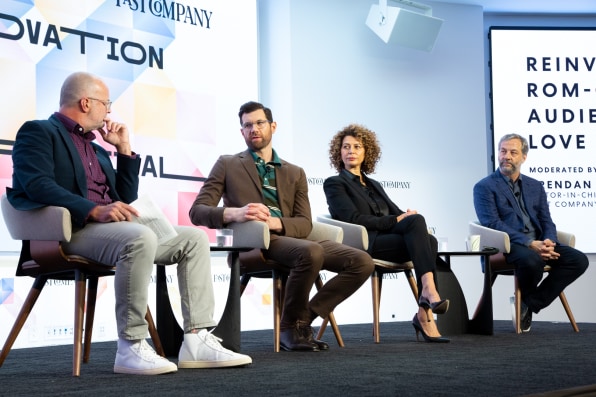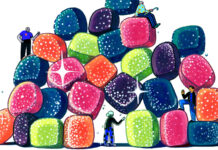Making the first gay romantic comedy to be released by a major studio didn’t start with anything other than Billy Eichner wanting to tell a good story.
That instinct for storytelling—albeit storytelling about something never before seen on the scale that Bros, with its 3,000-theater domestic release, will see—was also what drew Judd Apatow to produce it, and part of why Donna Langley’s Universal film group opted to distribute it.

These insights, and a look at why many in the industry are bullish about audiences returning to theaters, emerged when Eichner, Langley, and Apatow took to the Fast Company Innovation Festival stage for a panel moderated by Fast Company editor-in-chief Brendan Vaughan.
Eichner pointed out that Hollywood has often been a bit ahead of politics in terms of cultural change, but it was backward on LGBTQ storytelling in spite of that. “I think there was a lot of fear and a bit of hypocrisy underneath the surface in terms of the powers that be—which were often straight men—questioning whether a story that centered on LGBTQ characters actually being told and portrayed by LGBTQ writers and actors might scare off the mainstream,” he said. “And the longer something isn’t done, the more fear grows around the idea of it happening.”

Enter Bros. While paying homage to the great hetero rom-coms of the late ’80s and ’90s, the movie is about the courtship of two gay men, played by Eichner and Luke Macfarlane. With an entirely LGBTQ cast that includes queer icons (Harvey Fierstein) and up-and-comers (Benito Skinner) alike, Bros is an example of a project Apatow has been drawn to backing—a passion project with something to say and the added bonus of coming from a group that hasn’t seen itself onscreen in this way.
“I just think that movies are better when you could tell that they’re not a product. [Bros] is so important to Billy, he wants to tell that story and you can feel that care in the movie,” Apatow said. That it can make serious money is icing on the cake. “It is just good business to make movies for people where they see themselves in the movies.”

Langley agreed, adding that she—and more importantly, audiences—are drawn to projects that can tell a good story in a way that resonates with them, regardless of factors like sexual orientation or genre. That some movies are getting people back to theaters has been heartening, given the early-pandemic prognostication about the death of theatrical-release films and streaming supremacy. Those conversations taught her, “In good times, it’s easier to trust your gut and keep going,” she said. “In bad times, and particularly in times where everything is changing so rapidly . . . you just have to keep going, trust that instinct, and be fearless.”

Though Bros and the upcoming George Clooney-Julia Roberts vehicle Ticket to Paradise smack of a rom-com renaissance, the wider success of theatrical releases like Jurassic World, Minions: The Rise of Gru, and Black Phone—which all came from disparate genres but found audiences in theaters—highlight an appetite for a good reason to get off the couch, and Eichner is excited that his film can play a part in that.
“It is so much fun to sit in a movie theater with hundreds of other people; friends, strangers by yourself on a date, whatever it is, and laugh with other people,” he said. “It’s an experience that we haven’t gotten in a long time because they don’t release these movies in movie theaters anymore, but there really is something special and comforting and joyful about watching it in a theater with lots of other people. I’m so excited that Bros is hopefully going to bring that experience back.”








